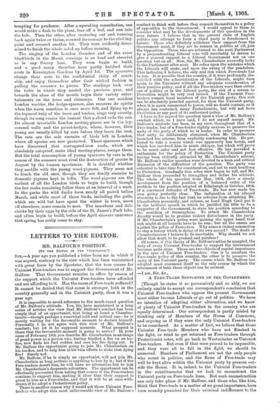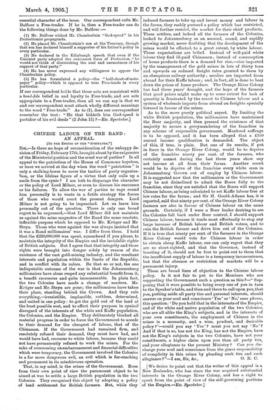[TO THE EDITOR OF TEE "SPECTATOR."]
Sin,—A year ago you published a letter from me in which it was argued, contrary to the view which has been maintained with great force by the Spectator, that the true course for Unionist Free-traders was to support the Government of Mr. Balfour. That Government remains in office by reason of the support which the Unionist Free-traders have afforded and are affording to it. Has the cause of Free-trade suffered P It cannot be denied that that cause is stronger, both in the country generally and in the Unionist party, than it was a
It is impossible to avoid reference to the much-vexed question of Mr. Balfour's attitude. Yon, Sir, have maintained in a long series of articles the view that Mr. Balfour's conduct has been simply that of an opportunist, that being at heart a Chamber- lainite—though perhaps a somewhat cold and critical one—he is merely waiting for the favourable moment to declare himself. Personally I do not agree with this view of Mr. Balfour's conduct; but let it be supposed accurate. What prospect is there that the favourable moment is going to arrive ? In your issue of February 18th you describe Mr. Chamberlain in an image of great power as a person who, having kindled a fire on an ice- • floe, now finds his fuel sodden and sees his fire dying out. Is Mr. Balfour the opportunist going to join Mr. Chamberlain on his ice-floe, and to help him in his vain efforts to stoke that dying fire ? Surely not.
Mr. Balfour, if he is simply an opportunist, will not join Mr. Chamberlain as long as there is anything to lose by it; but if the Free-traders desert him, he will have no alternative but to join Mr. Chamberlain's desperate adventure. The opportunist can be effectually prevented from taking that course if the Free-traders continue to support him making it clear that their support is given to him as a Free-trader, and that it will be at once with- drawn if he adopt a Protectionist policy.
There is another reason why I would ask those Unionist Free- traders who adopt this most unfavourable view of Mr. Balfour's
—I am, Sir, &c.,
conduct to think well before they commit themselves to a policy of opposition to the Government. I would appeal to them to consider what may be the developments of this question in the near future. I believe that in the present state of English politics any attempt to form a third party is foredoomed to failure. Those who definitely withdraw their support from the Government must, if they are to remain in politics at all, join the Opposition. Those who are returned to the next Parliament by a preponderating Liberal vote will inevitably be driven to give a general support to a Liberal Government not on one question but on all. Now, Sir, Mr. Chamberlain avowedly looks to the Parliament after next. He relies upon the mistakes which the Liberals will make, and upon the swing of the pendulum. This indicates, I believe, the only real risk which Free-trade has to run. It is possible that the country, if it were profoundly dis- satisfied with the administration of the Liberals, might turn again to the Unionists without any adequate consideration of their positive policy, and if all the Free-traders were then either out of politics or in the Liberal party, the risk of a return to Protection might be very real indeed. If the Unionist Free- traders remain loyal members of the Unionist party, this risk can be absolutely guarded against, for then the Unionist party, when it is again summoned to power, will no doubt contain, as it always has contained, many Protectionists, but will not have Protection as any part of its authorised policy. I have so far argued the question upon a view of Mr. Balfour's conduct which, as I have said, I do not myself accept. Mr. Balfour's attitude has been, in my view, throughout that of a Free-trader, but of a Free-trader rightly anxious to preserve the unity of the party of which he is leader. In order to preserve that unity be deliberately abstained, when Mr. Chamberlain launched his scheme, from explicitly condemning him. He pre- ferred to take a course which was apparently less heroic, and which has involved him in much obloquy, but which will prove to be much safer and not less effective. He has provided a euthanasia for the policy of Protection. The Unionist party having been violently attracted by Mr. Chamberlain's scheme, Mr. Balfour's earlier speeches were devoted to a keen and critical discussion of the difficulties of the question. The party was exhorted to take time for consideration, and not to rush headlong to Protection. Gradually this sober view began to tell, and Mr. Balfour then proceeded to strengthen and define his attitude. The whole of his speeches from May, 1903, show a steady development from the position of a balanced critic of the problem to the position adopted at Edinburgh in October, 1904, of a convinced defender of Free-trade. He has now made his own policy perfectly clear. The indignation at his alleged obscurity is duo to the fact that he refrains from attacking Mr. Chamberlain personally, and refuses, as Lord Hugh Cecil put it in the brilliant speech in which he justified his title to be a supporter of the Government, to state his position according to the meridian of Birmingham. To attack Mr. Chamberlain directly would be to produce violent disturbance in the party. If Mr. Chamberlain's policy were gaining the upper hand, that risk might at all hazards have to be run ; but all the omens are against the policy of Protection. Why cause a violent commotion to slay a heresy which is dying of its own accord ? The death of Chamberlainism I believe to be inevitable. Why should we not allow that death to be gradual and painless ?
Of course, if this theory of Mr. Balfour's action be accepted, the duty of every Unionist Free-trader to support the Government becomes quite clear. There are two objects of capital importance in the eyes of Unionist Free-traders. One is to maintain the Free-trade policy of this country, the other is to preserve tho unity of the Unionist party. The course which Mr. Balfour has adopted must commend itself as the only course by which tho attainment of both these objects can be secured.
[Though be states it so persuasively and so ably, we arc entirely unable to accept our correspondent's conclusion that Unionist Free-traders who oppose the present Government must either become Liberals or go out of politics. We have no intention of adopting either alternative, and we know of plenty of Unionist Free-traders in the country who are equally determined. Our correspondent is partly misled by thinking only of Members of the House of Commons, and arguing as if they were the only Unionist Free-traders to be considered. As a matter of fact, we believe that those Unionist Free-trade Members who have not flinched in the fight, or tried to get returned as Free-traders through Protectionist votes, will go back to Westminster as Unionist Free-traders. But even if that were proved to be impossible, and they were all to fall in the fight, we should be unmoved. Members of Parliament are not the only people who count in politics, and the flame of Free-trade may well be kept alive within the Unionist party by persons out- side the House. It is, indeed, to the Unionist Free-traders in the constituencies that we look to reconstruct the Unionist party on Free-trade lines. But such reconstruction can only take place if Mr. Balfour, and those who, like him, think that Free-trade is a matter of no great importance, have been soundly punished for their criminal indifference to the
(1) Mr. Balfour wished Mr. Chamberlain "God-speed" in his Protectionist propaganda.
(2) He placed Mr. Chamberlain's son at the Treasury, though that son has declared himself a supporter of his father's policy in every particular.
(3) He declared in the Edinburgh speech that even if the Unionist party adopted the extremest form of Protection, "he would not think of diminishing the zeal and earnestness of his support of that party."
(4) He has never expressed any willingness to oppose the Chamberlain policy.
(5) He has formulated a policy—the " half-sheet-of-note- paper " policy—which is opposed to true Free-trade in every particular.
If our correspondent holds that these acts are consistent with a bond-fide belief in and loyalty to Free-trade, and are acts appropriate to a Free-trader, then all we can say is that we and our correspondent must attach wholly different meanings to the word "Free-trade." As to (1), does our correspondent remember the text : "He that biddeth him God-speed is partaker of his evil deeds" (2 John 11) P—En. Spectator.]











































 Previous page
Previous page